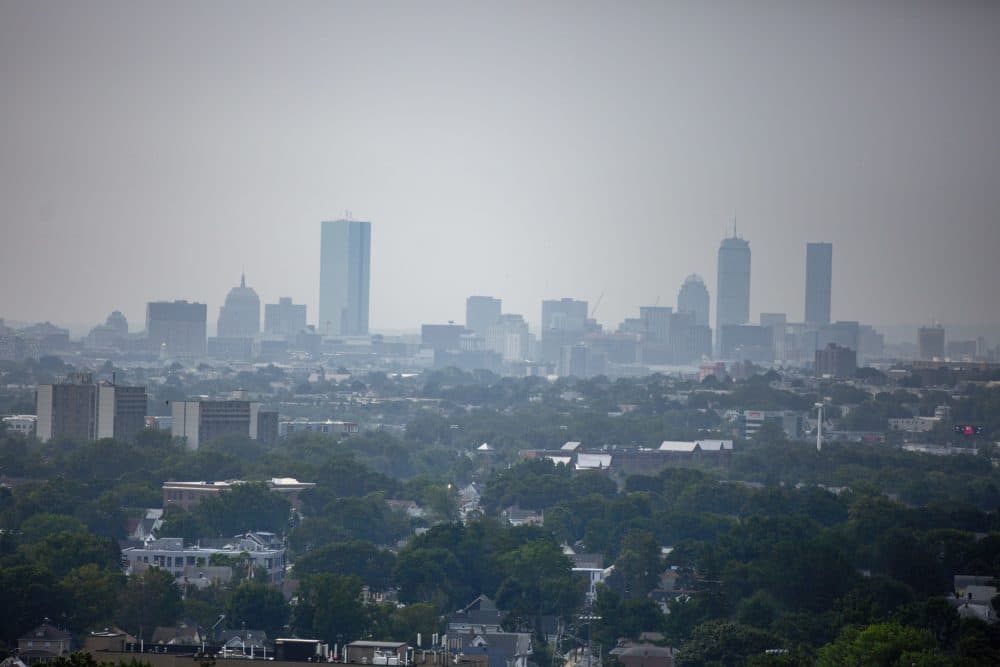Advertisement
Boston Mayoral Candidates Promise To Take On Climate Change
Resume
Climate change has become an increasingly urgent issue with wildfires burning in the West, rising sea levels lapping the coasts and record temperatures everywhere.
It's also become a hot topic in the Boston mayoral race.
All five major candidates running for mayor of Boston have unveiled plans to deal with climate change. The proposals range from simply updating building codes, to setting a strict deadline to reduce Boston’s carbon emissions to zero.
“Cities must lead the way,” City Councilor Michelle Wu said, “Boston must lead the way.”
Most of the plans include transportation, a major contributor to greenhouse gas emissions. Ideas include adding more charging stations for electric vehicles, expanding bike lanes and converting buses to renewable power.
Several mayoral candidates spoke passionately about encouraging people to bike and take public transportation at a recent forum on climate change.
Councilor Annissa Essaibi George promised to invest in both electric vehicles and public transit.
“We know that our climate response needs to be rooted in transit. We know that nearly a third of Boston's total carbon emissions come from transportation and 65% of those come from personal vehicles,” Essaibi George said.
Another candidate, John Barros, said he supports expanding dedicated bus and bike lanes.
Other cities across the country have launched similar projects to address climate change.
“Mayors have an obligation to do what they can in their community, to be a leader around climate change," said Satya Rhodes-Conway, mayor of Madison, Wisconsin, “Through just day to day work of a city, there’s plenty of ways you can find efficiencies and reduce emissions.”
Rhodes-Conway also leads a group of about 470 mayors called Climate Mayors. Former Boston Mayor Marty Walsh was head of the group until he stepped down in March to become U.S. labor secretary.
In Worcester, a crew was busy recently installing a huge solar array over the parking lot at North High School. It’s one of four solar power projects the city has underway.
"This is our latest push to increase solar production in the city," said Luba Zhaurova, project director at Worcester’s newly-formed Department of Sustainability and Resilience. The department is working on a plan to make the city one of the most sustainable cities in the U.S. by 2050.
"One can frame it as a climate change measure. Someone can say it’s a resilience measure, someone can say it's a livability measure, someone says it's a health, improving health of our residents measure, but ultimately, we're talking about the same things," Zhaurova said.
Still, some advocates warn that it's too late to stop climate change from happening altogether.
So, they argue cities also need to find ways to shore up buildings and other infrastructure to better withstand rising sea levels, increased heat waves, and other climate changes.
“We thought we had time to think about climate change and to sort of get our act together and that time has gone. It is here,” said Erika Spanger-Siegfried from the Union of Concerned Scientists, a nonprofit climate advocacy group.
Spanger-Siegfried said coastal cities like Boston increasingly face threats from rising ocean levels.
Miami expects to spend $4 billion in the next four decades to deal with rising sea levels, according to the city’s stormwater master plan.
And in Chicago, the city is planting new species of trees that can better withstand warmer weather.
John Cleveland, the executive director of Boston’s Green Ribbon Commission, said the mayors of virtually every major city have acknowledged the need to address climate change.
“It's kind of hard to get elected these days in a big urban center if you're anti-climate,” he said. "You just don't find it, at least in the larger cities, you just don't find any mayors who are campaigning on climate denial."
But he said it's not easy.
Climate change plans can take large amounts of time and money — energy many politicians and voters would love to spend on other pressing issues, like improving education, expanding access to health care, or creating jobs.
“This is going to take a lot of hard work and we have to expend political capital to make this stuff happen. But, you know, the risk and the crisis is extreme enough now that it's pretty hard to say no,” Cleveland said.
_
Correction: An earlier version of this story incorrectly attributed a quote from state Representative Jon Santiago to John Barros.
This segment aired on August 31, 2021.